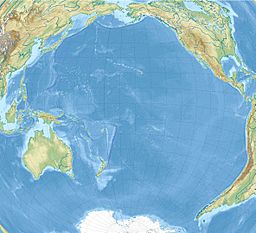Blue Lake (Raoul Island) facts for kids
Quick facts for kids Blue Lake |
|
|---|---|
| Location | Raoul Island, Kermadec Islands |
| Coordinates | 29°15′20″S 177°54′50″W / 29.25556°S 177.91389°W |
| Type | crater lake |
| Basin countries | New Zealand |
| Surface area | 80 ha (200 acres) |
Blue Lake is a small, beautiful lake found on Raoul Island. This island is part of New Zealand's Kermadec Islands. Blue Lake is one of two tiny lakes located inside a volcano's crater. The other lake is called Green Lake. Blue Lake covers an area of about 0.5 square kilometers.
Contents
What is Blue Lake?
Blue Lake is a special kind of lake known as a crater lake. This means it formed inside the bowl-shaped opening of a volcano. After a volcano erupts, its top can collapse, forming a crater. Over time, rain and groundwater can fill this crater, creating a lake.
How do crater lakes form?
Crater lakes are often found in areas with active or dormant volcanoes. When a volcano erupts, it can create a large hollow space. This space is called a caldera or a crater. If enough water collects in this hollow, a lake is born. The water in crater lakes can sometimes be very acidic or have unique colors due to minerals from the volcano.
Where is Blue Lake located?
Blue Lake is located on Raoul Island. This island is the largest of the Kermadec Islands. The Kermadec Islands are a chain of volcanic islands. They are found in the Pacific Ocean, northeast of New Zealand's North Island.
Raoul Island: A Volcanic Home
Raoul Island is an active volcano. It has erupted several times throughout history. Despite being volcanic, the island is home to unique plants and animals. It is also a nature reserve. Scientists and conservationists often visit Raoul Island to study its special environment. The island's volcanic activity is what created lakes like Blue Lake and Green Lake.
Blue Lake's Neighbor: Green Lake
Blue Lake shares Raoul Island with another crater lake, Green Lake. Both lakes are important features of the island's volcanic landscape. They show how powerful natural forces can shape our world. These lakes are a reminder of the island's fiery past.


